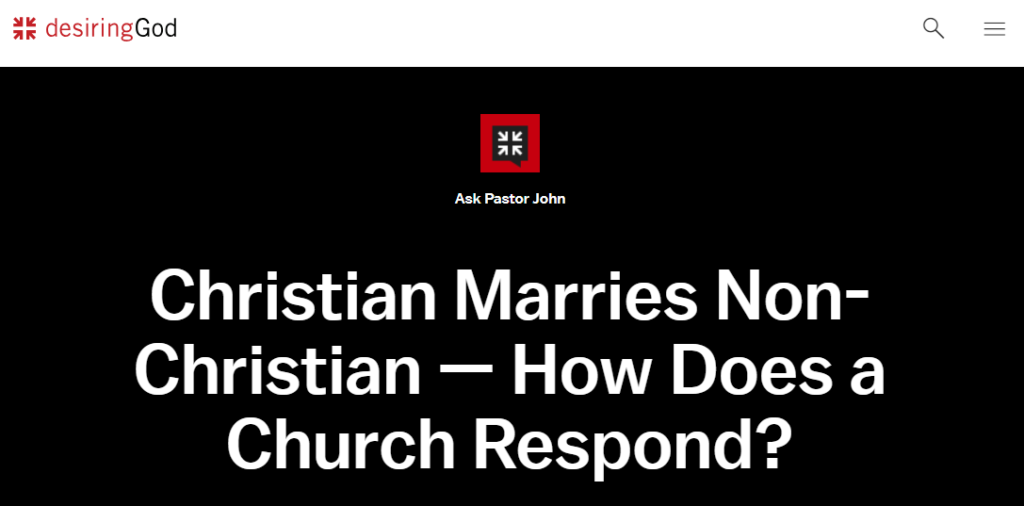
In the above link, John Piper offers practical advice to churches with regard to dealing with Christians who persisted in marrying non-Christians (despite clear objections from church authorities).
John Piper’s stand on this issue is excommunication. Piper offers reasons for his stand:
1) It is sin against Scripture (1 Cor 7:39)
2) The Christian has compromised his/her love for Christ
3) The Christian has spurned church authorities
4) Enforcing excommunication is a position grounded in Scripture – Piper says: “In 2 Thessalonians 3:14–15 and in 1 Corinthians 5:4–5, Paul holds out the possibility and the desire that by means of such holy ostracism, people will, in fact, be saved and restored.”
My thoughts…
For 1, 2 & 3, this is true for Christians who persisted in marrying non-Christians, but also true for any other sort of sins. For example, a Christian could be guilty of 1, 2 & 3 by persistently engaging in gossip or other unloving behaviours.
So perhaps what sets this sin apart as an “excommunication sin” is item 4? Let’s take a closer look at the two Scriptures that Piper quoted.
2 Thess. 3:14 says: “Take special note of anyone who does not obey our instruction in this letter. Do not associate with them, in order that they may feel ashamed.”
Looking at the context, I am more inclined to think that excommunication here applies specifically to disruptive idlers (v6-11). If not, if we consider “instruction in this letter” in a broad sense, then the entire letter includes praying for the apostles (3:1). Not likely that failure to pray should lead to excommunication?
1 Cor. 5:11 says: “But now I am writing to you that you must not associate with anyone who claims to be a brother or sister but is sexually immoral or greedy, an idolater or slanderer, a drunkard or swindler. Do not even eat with such people.”
Again, if we apply this too broadly, many of our daily thoughts and actions would fall under idolatry (Colossians 3:5 – “Put to death therefore what is earthly in you: sexual immorality, impurity, passion, evil desire, and covetousness, which is idolatry.”) So the better option is perhaps to keep it narrow. For example, to excommunicate Christians who are worshipping idols in a religious sense or excommunicate the Christian caught stealing church funds as opposed to the Christian greedy for the million dollar lottery prize.
Therefore, Piper’s stand to apply excommunication on Christians who persisted in getting married to non-Christians; such a severe discipline stance is really one end of the spectrum. I am not sure how many churches out there would subscribe to that end of the spectrum (I suspect not many). Here is the other possible end of the spectrum:
“Yet, having said that, there is another category of believers with whom we must exercise an extra measure of compassion and graciousness. These are those who have already gotten into an unequally yoked marriage. These are the ones we show gentleness to and pray that they find unconditional acceptance in the community life of the church. Even though we do not compromise the truth with them (for they too need to be armed with the truth in order to influence the next generation rightly), it is our desire to journey pastorally with such marriages in the hope that the unbelieving spouse will one day come to faith and new life in Christ. Therefore, we do well to befriend their non-Christian spouses and approach the subject with them gently and with great patience. In contrast, when speaking about this subject to Christian singles who still have the potential for a Christian marriage, we want to be firm and forceful, clear and direct with the truth. Therefore, this is the tension a wise minister must maintain.” – Why Cannot: Scriptural View of Christians Dating and Marrying Non-Christians, page 23.
